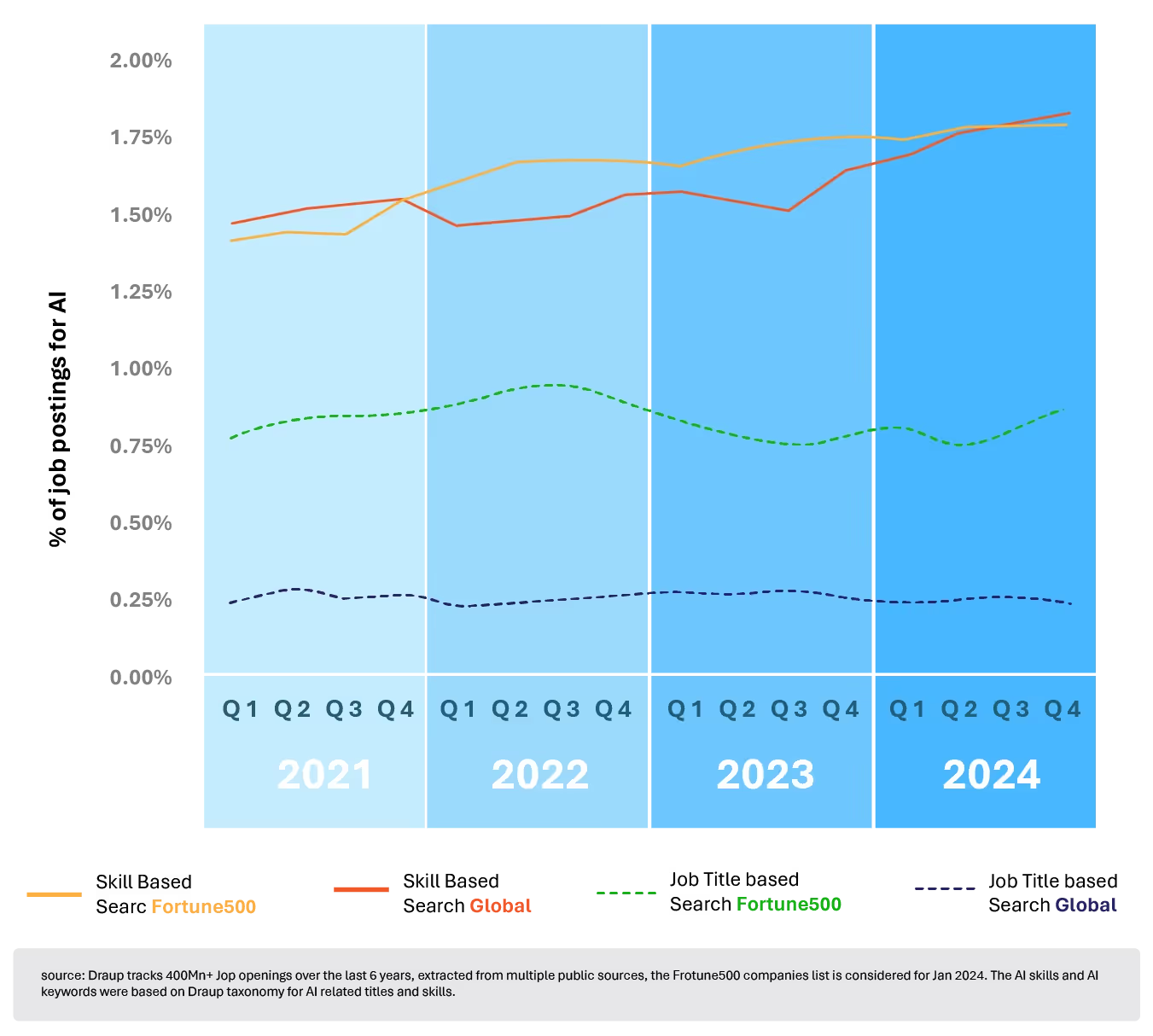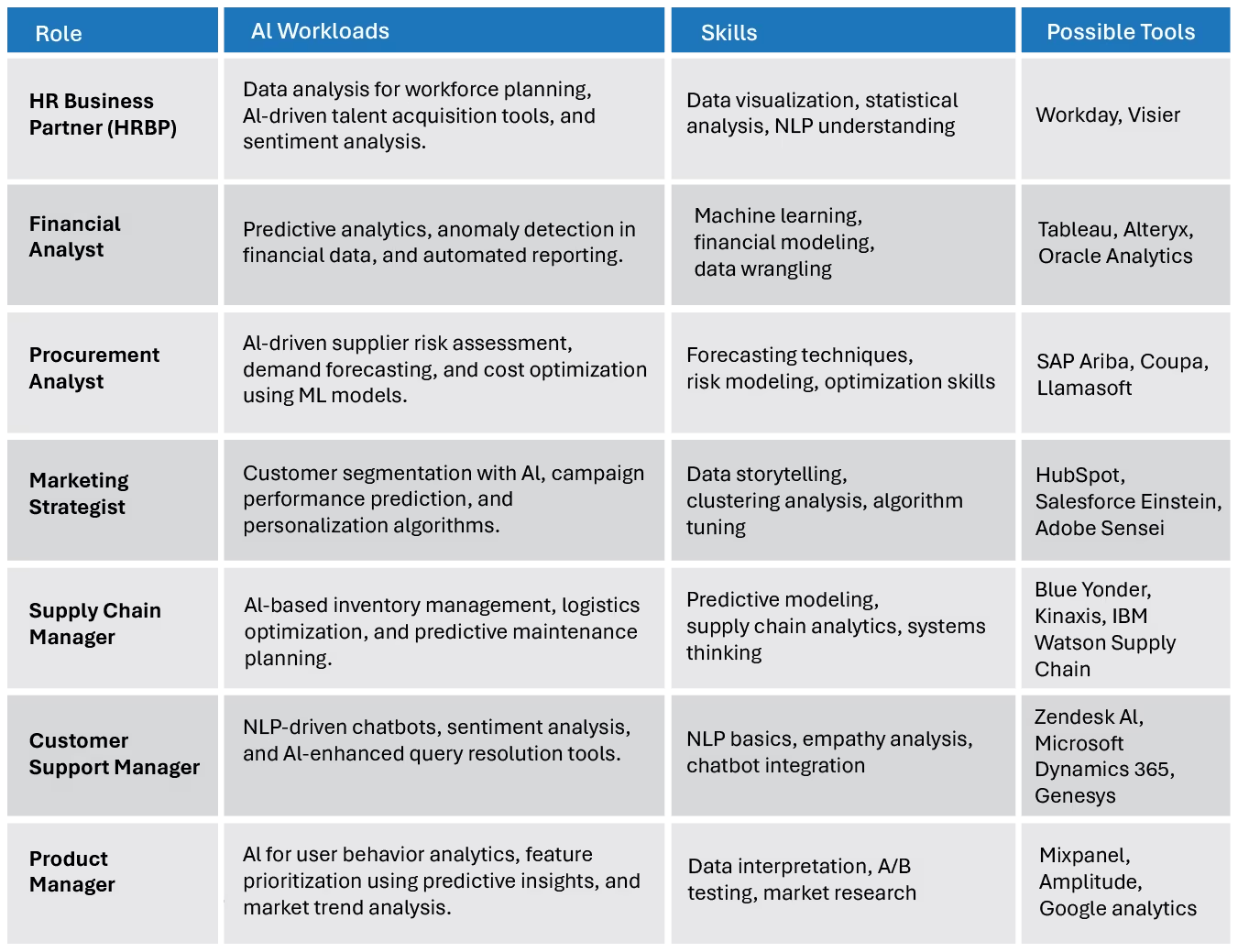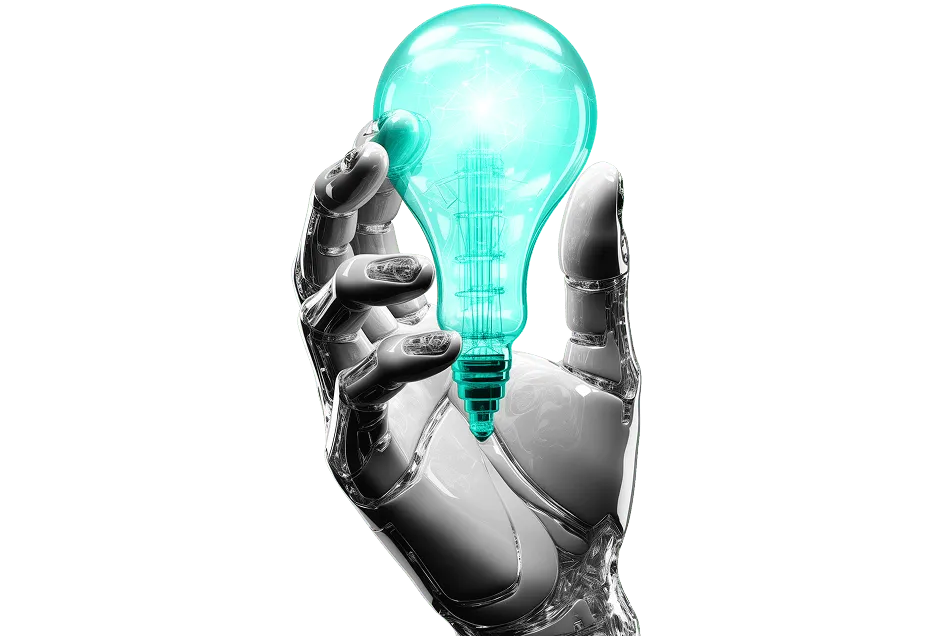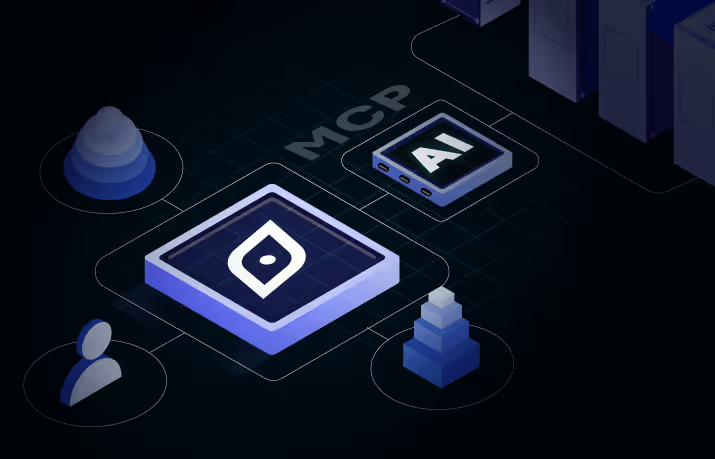Beyond AI Centers of Excellence: Embedding AI Skills and AI Talent Intelligence Across Organizations
The integration of Artificial Intelligence (AI) is rapidly transforming the business landscape. While dedicated AI teams and Centers of Excellence (COEs) play a crucial role in driving advanced research and development, a new imperative is emerging: democratizing AI skills across the entire organization. AI Talent Intelligence supports this shift by identifying skill gaps, guiding upskilling efforts, and empowering employees to leverage AI in their daily work driving wider adoption and unlocking AI’s transformative potential. This approach allows businesses to improve strategic workforce planning efficiency, enhance decision-making, and foster a culture of innovation.
The Evolving Demand for AI Skills Proficiency and AI Talent Intelligence
We’re witnessing a clear trend: the demand for AI-related skills is surging, while the growth of dedicated AI roles remains relatively stable. AI Talent Intelligence reveals a growing emphasis on integrating AI capabilities into existing job functions rather than creating entirely new AI-specific positions.

This trend is supported by data from Draup’s AI talent intelligence, which has tracked job postings over the past six years. Our analysis reveals a significant increase in the percentage of job postings requiring AI-related skills, both globally and within Fortune 500 companies, particularly since 2021. Conversely, the growth in job postings specifically for AI roles has been minimal.
This data underscores the talent management shift towards embedding AI competencies within a wide range of roles. Companies are recognizing the value of empowering their existing workforce with AI skills, guided by AI talent intelligence, rather than relying solely on specialized AI teams.
Integrating AI Across Roles, Workloads, and Tools
This democratization of AI manifests in the integration of AI-driven tools, AI talent intelligence, and workflows across various departments and job functions. Here are a few examples:

Some more examples below:
- Marketing: Marketing professionals can leverage AI for tasks like personalized campaign optimization, predictive lead scoring, and content generation. Tools like AI-powered marketing automation platforms and customer data platforms are becoming increasingly prevalent.
- Sales: Sales teams can utilize AI for lead qualification, sales forecasting, and personalized customer engagement. AI-driven CRM systems, sales intelligence platforms, and AI talent intelligence can significantly enhance sales performance by aligning the right talent with the right opportunities.
- Customer Service: AI-powered chatbots and virtual assistants can handle routine inquiries, freeing up human agents to focus on more complex customer issues. Sentiment analysis tools can also help gauge customer satisfaction and identify areas for improvement.
- Product Development: Adobe Sensei integrates AI into design workflows, allowing teams to automate repetitive tasks and generate design variations quickly.
- Operations: AI can optimize supply chain management, predict equipment failures, and automate routine tasks. IBM Maximo uses AI to monitor equipment health and predict failures, enabling proactive maintenance and minimizing downtime.
- Human Resources: AI can streamline recruitment processes, personalize employee training programs, and improve workforce planning. AI Talent Intelligence platforms like Draup are leading the way in delivering these capabilities.
The Benefits of Democratizing AI Talent Intelligence
This strategic shift towards embedding AI skills across the organization supported by AI talent intelligence offers several key benefits:
- Increased Agility and Innovation: By empowering employees with AI tools, companies can foster a culture of experimentation and innovation, leading to the development of new products, services, and business models.
- Improved Productivity and Efficiency: AI can automate repetitive tasks, freeing up employees to focus on higher-value activities, leading to increased productivity and efficiency gains.
- Enhanced Decision-Making: AI-powered analytics can provide valuable insights into business operations, enabling data-driven decision-making and improved outcomes.
- Greater Employee Engagement: Providing employees with opportunities to develop and utilize AI skills can increase engagement and job satisfaction, leading to higher retention rates.
- Competitive Advantage: Companies that effectively integrate AI and AI Talent Intelligence across their operations can gain a significant competitive edge in the rapidly evolving digital landscape.
Building a Successful AI-Powered Organization
Democratizing AI is not simply about providing access to tools; it’s about fostering a culture of learning, experimentation, and responsible AI adoption. By investing in training, leveraging AI talent intelligence, establishing clear guidelines, and promoting cross-functional collaboration, organizations can unlock the full potential of AI and empower their workforce to thrive in the age of intelligent automation.
The future of work is not about humans vs. machines; it’s about humans with machines. By embracing a democratized approach to AI-powered workforce planning, organizations can create a future where humans and AI work together to achieve extraordinary outcomes.










.svg)

















.svg)





.svg)





.svg)
